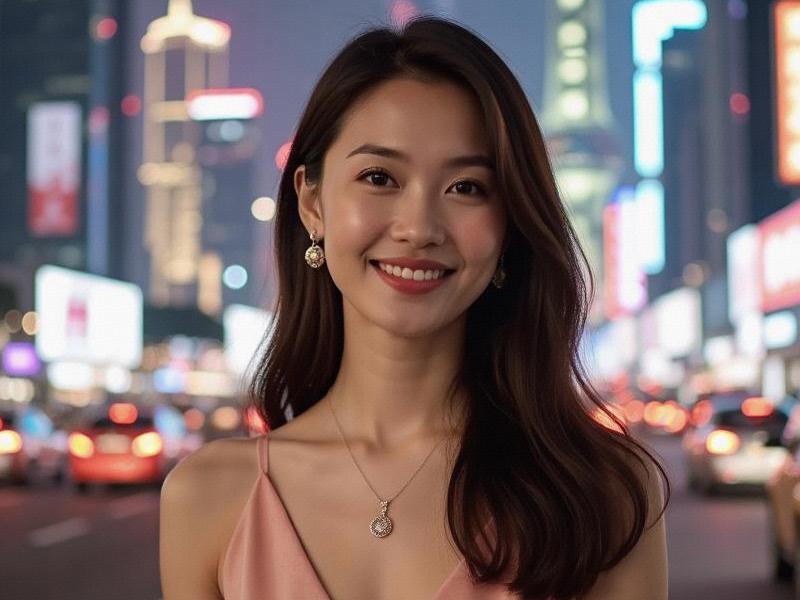The Shanghai Style: How Women in China's Cosmopolitan Capital Are Redefining Modern Femininity
⏱ 2025-06-18 00:34 🔖 上海龙凤419
📢0℃

In the neon-lit streets of Shanghai, a quiet revolution in femininity is taking place. The women of China's most cosmopolitan city are crafting a new paradigm of modern womanhood that balances career ambitions with cultural heritage, global trends with local identity.
The Shanghai Aesthetic
Shanghai women have long been celebrated for their distinctive style - what locals call "Haipai" (Shanghai-style) elegance. Unlike Beijing's political gravitas or Guangzhou's commercial pragmatism, Shanghai's femininity carries a unique blend of 1920s nostalgia and futuristic chic.
Fashion historian Dr. Li Wen explains: "The Shanghai look combines qipao silhouettes with Parisian tailoring, Ming dynasty-inspired makeup with Korean skincare routines. It's a cultural remix that only makes sense here."
From the boutiques of Julu Road to the concept stores in West Bund, Shanghai's fashion scene reflects this hybrid aesthetic. Local designers like Helen Lee and Uma Wang have gained international recognition for collections that reinterpret Chinese motifs through contemporary lenses.
夜上海最新论坛 Career Women of the New Economy
With Shanghai's female labor participation rate at 68% (10 points above the national average), the city's professional women are breaking glass ceilings across industries. In the gleaming towers of Lujiazui, female executives now comprise 39% of senior management in financial firms - the highest percentage in mainland China.
Tech entrepreneur Zhao Min, founder of AI startup Nebula Systems, shares her experience: "Shanghai rewards competence over connections. My investors never questioned whether a woman could lead a deep tech company - they only cared about our IP portfolio."
This professional confidence manifests in surprising ways. Shanghai leads China in female entrepreneurship (32% of registered businesses), women pursuing MBAs (47% of local graduates), and dual-career households (82% of married couples).
Cultural Guardians and Innovators
上海贵族宝贝龙凤楼 Beyond boardrooms and runways, Shanghai's women are preserving cultural traditions while pushing boundaries. At the Shanghai Kunqu Opera Troupe, performers like Shen Yili are modernizing this 600-year-old art form with contemporary stagings that attract young audiences.
Meanwhile, feminist collectives like "Ladies Who Tech" host sold-out coding workshops, while book clubs dissect everything from Simone de Beauvoir to the latest domestic novels about urban loneliness.
The Beauty Paradox
Shanghai's beauty industry (worth ¥87 billion in 2024) reveals intriguing contradictions. While K-pop influenced plastic surgery remains popular, there's growing demand for "natural enhancement" procedures that emphasize individual features rather than Westernized ideals.
Dermatologist Dr. Wang Xia notes: "Our patients increasingly want treatments that enhance their Shanghainese characteristics - the delicate jawline, almond eyes - rather than erase them."
上海娱乐
Challenges and Progress
Despite advancements, challenges persist. The "leftover women" stigma still pressures unmarried professionals over 30, while workplace discrimination cases continue to surface. However, legal reforms like Shanghai's pioneering anti-sexual harassment ordinances (2023) and expanded childcare subsidies signal changing attitudes.
The Shanghai Woman of Tomorrow
As China's demographic crisis deepens, Shanghai's approach to gender equality may offer solutions. The city's policies supporting working mothers (including Asia's most generous parental leave) have stabilized its fertility rate at 1.3 - significantly higher than Beijing's 0.9.
Sociologist Chen Ying predicts: "The Shanghai model - where women don't have to choose between careers and family - could redefine success for China's next generation."
From the jazz-age glamour of the Bund to the tech hubs of Zhangjiang, Shanghai's women continue to write their own rules. In doing so, they're not just shaping a city's identity, but potentially charting a new course for Asian femininity in the 21st century.
Shanghai and Its Surrounding Areas: A Comprehensive Overview of the Yangtze River Delta RegionThe Evolution of Shanghai's Nightlife: Inside the City's Most Exclusive Entertainment ClubsShanghai 2025: The Silent Revolution Creating the World's First Post-Modern MegacityShanghai 2030: Where Futurism Meets Heritage in China’s Global Megacity【建筑诗行】上海天际线的百年对话:从外滩万国建筑到垂直森林的都市语法Shanghai 2030: The Making of a Next-Generation Global CityShanghai Chic: The Global Rise of China's Most Influential Urban AestheticShanghai 2025: Where Futuristic Innovation Meets Timeless TraditionShanghai 2025: Where Ancient Water Towns Meet Quantum Computing【海派芳华】百年上海滩的美丽密码:从名媛到都市丽人的时尚进化史

